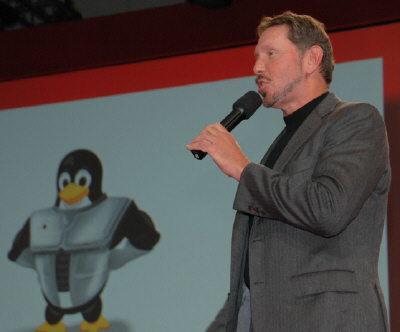Ellison's Red Hat hijacking maneuver

I was talking to Goldman Sachs sage Rich Sherlund about Oracle's move to basically hijack Red Hat's Linux by rolling its own binary distro based on Red Hat and starting a support price war that Oracle can win. Rick said that "Larry is driving now," and didn't want to end up in a situation again where an operating system vendor was in control (Microsoft) of a growing software stack. It didn't help Ellison's mood that Red Hat bought JBoss.
Rick believes that Red Hat will run into the arms of open source MySQL, Ingres and others to confront the Oracle stack. Ellison said that his goal in create what is called Unbreakable Linux is to "enhance and speed the adoption of Linux and make it mission critical in the datacenter." There is truth in that statement, but it's also about ownership and dominance, which is somewhat antithetical in the open source world. Because Red Hat is truly open source in making its code available, there is nothing to prevent Oracle from taking the code, synching with it, erasing trademarks and rolling its own compatible distributions.
That is the price of playing on the level playing field of open source, which is why many open source companies go commercial, throwing in a healthy dose of proprietary software to keep the wolves away. Ellison is baking an entire hybrid stack, from operating system and middleware to database and applications. As Ellison said during a Q&A following the announcement, "This is capitalism, we are competing....we are trying to offer a better product at a lower price."
Matt Asay thinks that Oracle is making a code forking maneuver, despite protests from the company"
This, incidentally, is still the best reason for Red Hat customers to stay with Red Hat for support: Red Hat is doing more to innovate and develop the kernel than anyone else, including Oracle. Source of code matters more than source code in Linux, and Red Hat is the predominant source.
Oracle customers need to ask themselves if they want a forked version of Red Hat Linux. Like Red Hat or not, they have served a useful function of consolidating interest in Linux and thereby fostering commercial adoption of Linux. By providing non-standard kernel patches, Oracle is forking the kernel and setting themselves up to support the fork forever.
It's possible that Oracle could do some forking, but it's not in the company's best interest, or customers' interest, to diverge from Red Hat open source code into Oracle open source code, at least now.

Watch the video of Ellison announcing Unbreakable Linux at OracleWorld
The question is how Red Hat and Linus Torvalds and his minions will react to how Oracle behaves moving forward with its newfound aggression in the Linux space, and whether Oracle can actually deliver a superior support experience. We are still waiting to hear from Red Hat CEO Matthew Szulik to address Oracle's encroachment on his territory, which in the first hours has punished his stock. More to come...
See also:
Dave Dargo, formerly of Oracle, where he headed the company's Linux Program Office and defined it's Linux strategy, and now CTO of Ingres, which competes with Oracle's database, takes a whack at analyzing Ellison's latest move. He looks at Oracle's Red Hat support pricing in the context of paying fees to use Oracle's other products:
If the limiting factor of adopting Linux is the price of support, are we going to see Oracle lower their prices? Oh, that’s right—Linux is open-source and has a competitive support model and Oracle is closed-source with a monopolistic support model. That’s why they can charge nearly $200,000 for their database, with no options, for a four processor box. Monopolistic vs. competitive; which is better for the customer?
Where are the support infrastructure networks for Oracle’s own products to automatically distribute fixes, patches and alerts? It’s amazing that they can provide all that for a mere $399 for a competitor’s products, but not for their own $200,000 product.